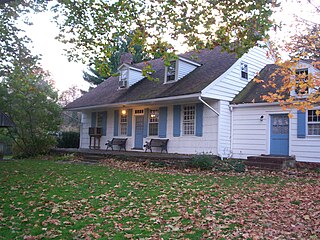
Franklin Township is a township in Somerset County, in the U.S. state of New Jersey. It is centrally located in the Raritan Valley region, within the New York Metropolitan Area. As of the 2020 United States census, the township's population was 68,364, an increase of 6,064 (+9.7%) from the 2010 census count of 62,300, which in turn reflected an increase of 11,397 (+22.4%) from the 50,903 counted in the 2000 census. The township was the state's 19th most-populous municipality in 2020, after being ranked 22nd in 2010.

Quakertown is an unincorporated community located within Franklin Township in Hunterdon County, New Jersey. It was once known as Fairview. The area was settled by Quakers from Burlington County, who organized a meeting house here in 1733. The Quakertown Historic District was listed on the state and national registers of historic places in 1990.

The Middlebush Village Historic District is a historic district located in the Village of Middlebush, an unincorporated community within Franklin Township, Somerset County, New Jersey. The district was added to the National Register of Historic Places on April 24, 2007. It includes 37 contributing buildings and three contributing sites.

The Lambertville Historic District is a 198-acre (80 ha) historic district encompassing the community centered around the intersection of Route 29 and Route 179 in the city of Lambertville in Hunterdon County, New Jersey, United States. The district was added to the National Register of Historic Places on June 30, 1983, for its significance in architecture, commerce, industry, and settlement. It includes 680 contributing buildings, and two contributing structures.

Tulipwood is a shingle style historic home at 1165 Hamilton Street in the Somerset section of Franklin Township, Somerset County, New Jersey, United States. It was designed by Jacob August Lienau.
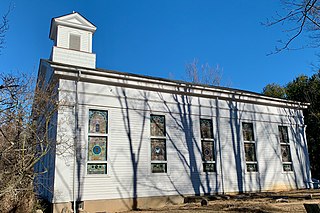
Cokesbury, historically known as Cokesburg, is an unincorporated community located on the border of Clinton and Tewksbury townships in Hunterdon County, New Jersey. It was named after two Methodist bishops, Coke and Asbury. The Cokesbury Historic District was listed on the state and national registers of historic places in 1997.
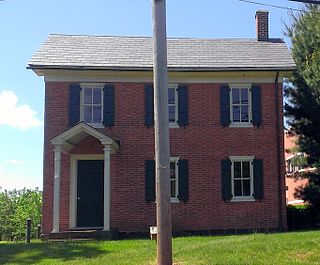
The Andrew Ten Eyck House is a historic farm house located at 671 Old York Road in the township of Branchburg in Somerset County, New Jersey. It was added to the National Register of Historic Places on May 6, 2004, for its significance in architecture.
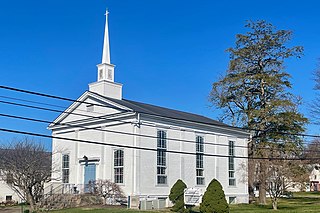
Mount Pleasant is an unincorporated community located along County Route 519 on the border of Alexandria Township and Holland Township, in Hunterdon County, New Jersey. The Mount Pleasant Historic District was listed on the National Register of Historic Places in 1987.

Reaville is an unincorporated community located along the border of East Amwell and Raritan townships in Hunterdon County, New Jersey. By the 1830s, it was known as Greenville. It was later renamed after Runkle Rea, the first postmaster in 1850.

Headquarters is an unincorporated community located within the Amwell Valley of Delaware Township in Hunterdon County, New Jersey. The settlement is centered around the intersection of Zentek Road and County Route 604. It is about 3 miles (4.8 km) from Ringoes to the east and 1 mile (1.6 km) from Sergeantsville to the west. The Headquarters Historic District was listed on the state and national registers of historic places in 2011 and had its boundary increased in 2016.

The Kingston Mill Historic District is a 49-acre (20 ha) historic district in Kingston, New Jersey. It is roughly bounded by the Millstone, River, and Princeton-Kingston Roads in the townships of Princeton in Mercer County, South Brunswick in Middlesex County, and Franklin in Somerset County. It was added to the National Register of Historic Places on April 10, 1986 for its significance in engineering, exploration/settlement, industry, and transportation. The district includes 16 contributing buildings and 2 contributing structures.

The Somerset Roller Mills, also known as the Jacobs Creek Grist Mill, are a small former gristmill complex, originally built in the early 18th century, near Titusville in Hopewell Township of Mercer County, New Jersey. It was added to the National Register of Historic Places on November 19, 1974 for its significance in architecture, commerce, and industry.

The North Branch Reformed Church is a historic church located on the eastern side of the North Branch of the Raritan River in North Branch, New Jersey at 203 New Jersey Route 28. It was formed by expansion from the Readington Reformed Church. The church was organized on September 10, 1825. The first church was built in 1826 and later rebuilt in 1874.

The Vail–Trust House is a historic building located at 255 Greenbrook Road in Green Brook Township, Somerset County, New Jersey. It was added to the National Register of Historic Places on October 7, 2008, for its significance in architecture.

The Lamington Historic District is a 84-acre (34 ha) historic district located along Lamington, Black River, Rattlesnake Bridge, and Cowperthwaite Roads in the Lamington section of Bedminster Township in Somerset County, New Jersey. It was added to the National Register of Historic Places on June 21, 1984, for its significance in architecture, exploration/settlement, and religion. The district includes 11 contributing buildings and 3 contributing sites.

The Bridgepoint Historic District is a 225-acre (91 ha) historic district located north of Rocky Hill along Bridgepoint and Dead Tree Run roads in Montgomery Township in Somerset County, New Jersey, United States. The district was added to the National Register of Historic Places on June 10, 1975, for its significance in agriculture and commerce from 1730 to 1850. It includes nine contributing buildings and two contributing structures.
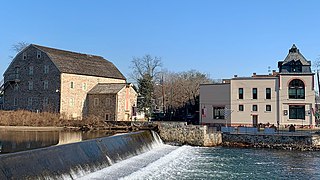
The Clinton Historic District is a 175-acre (71 ha) historic district encompassing much of the town of Clinton in Hunterdon County, New Jersey. It was added to the National Register of Historic Places on September 28, 1995, for its significance in architecture, commerce, engineering, industry and exploration/settlement. The district includes 270 contributing buildings, one contributing structure, and three contributing sites. Five were previously listed on the NRHP individually: Dunham's Mill, M. C. Mulligan & Sons Quarry, Music Hall, Old Grandin Library, and Red Mill.

The Jacob Wise Neighbor House is a historic house built c. 1830 and located at 143 West Mill Road near Long Valley in Washington Township, Morris County, New Jersey. The J. W. Neighbor House was added to the National Register of Historic Places on February 22, 1991, for its significance in architecture. The 3.5-acre (1.4 ha) property overlooks the valley formed by the South Branch Raritan River. It is now the Neighbour House Bed & Breakfast.

Franklin Corners is an unincorporated community located along the Passaic River at the intersection of County Route 613 and U.S. Route 202 in Bernards Township of Somerset County, New Jersey. In the 19th century, it had a grist mill, saw mill, general store, school, and several houses. The Franklin Corners Historic District, featuring Van Dorn's Mill, was listed on the National Register of Historic Places in 1975.

The Washington Park Historic District is a 100-acre (40 ha) historic district located in the borough of North Plainfield in Somerset County, New Jersey. It was added to the National Register of Historic Places on April 9, 1987, for its significance in architecture, landscape architecture, and community planning. Featuring houses built from 1868 to 1917, the district includes 145 contributing buildings.


























